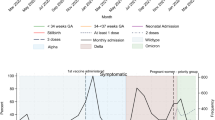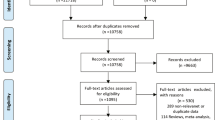Abstract
Objective
To learn how diverse mothers whose babies required a neonatal intensive care unit (NICU) stay evaluate their obstetric and neonatal care.
Study design
We conducted three focus groups stratified by race/ethnicity (Black, Latina, White, and Asian women, n = 20) who delivered infants at <32 weeks gestation or <1500 g with a NICU stay. We asked women to assess perinatal care and applied classic qualitative analysis techniques to identify themes and make comparisons across groups.
Results
Predominant themes were similar across groups, including thoroughness and consistency of clinician communication, provider attentiveness, and barriers to closeness with infants. Care experiences were largely positive, but some suggested poorer communication and responsiveness toward Black and Latina mothers.
Conclusion
Feeling consulted and included in infant care is critical for mothers of high-risk neonates. Further in-depth research is needed to remediate differences in hospital culture and quality that contribute to disparities in neonatal care and outcomes.
This is a preview of subscription content, access via your institution
Access options
Subscribe to this journal
Receive 12 print issues and online access
$259.00 per year
only $21.58 per issue
Buy this article
- Purchase on Springer Link
- Instant access to full article PDF
Prices may be subject to local taxes which are calculated during checkout
Similar content being viewed by others
References
Mathews TJ, MacDorman MF, Thoma ME. Infant mortality statistics from the 2013 period linked birth/infant death data set. Natl Vital- Stat Rep. 2015;64:1–30.
Martin JA, Hamilton BE, Osterman MJ, Driscoll AK, Drake P. Births: final data for 2017. Hyattsville, MD: National Center for Health Statistics; 2018. Contract No.: 8.
Mydam J, David RJ, Rankin KM, Collins JW. Low birth weight among infants born to Black Latina women in the United States. Matern Child Health J. 2019;23:538–46.
Schempf AH, Branum AM, Lukacs SL, Schoendorf KC. The contribution of preterm birth to the Black-White infant mortality gap, 1990 and 2000. Am J Public Health 2007;97:1255–60.
Janevic T, Zeitlin J, Auger N, Egorova NN, Hebert P, Balbierz A, et al. Association of race/ethnicity with very preterm neonatal morbidities. JAMA Pediatr. 2018;172:1061–9.
Howell EA, Janevic T, Hebert PL, Egorova NN, Balbierz A, Zeitlin J. Differences in morbidity and mortality rates in Black, White, and Hispanic very preterm infants among New York City hospitals. JAMA Pediatrics. 2018;172:269–77.
Howell EA, Zeitlin J. Improving hospital quality to reduce disparities in severe maternal morbidity and mortality. Semin Perinatol 2017;41:266–72.
Ford CL, Airhihenbuwa CO. Critical Race Theory, race equity, and public health: toward antiracism praxis. Am J Public Health. 2010;100:S1–S35.
Howell EA, Brown H, Brumley J, Bryant AS, Caughey AB, Cornell AM, et al. Reduction of peripartum racial and ethnic disparities: a conceptual framework and maternal safety consensus bundle. Obstet Gynecol. 2018;131:770–82.
Fenwick J, Barclay L, Schmied V. Struggling to mother: a consequence of inhibitive nursing interactions in the neonatal nursery. J Perinat Neonat Nurs. 2001;15:49–64.
Fenwick J, Barclay L, Schmied V. Craving closeness: a grounded theory analysis of women’s experiences of mothering in the Special Care Nursery. Women Birth 2008;21:71–85.
Fernandez Medina IM, Granero-Molina J, Fernandez-Sola C, Hernandez-Padilla JM, Camacho Avila M, Lopez Rodriguez MDM. Bonding in neonatal intensive care units: experiences of extremely preterm infants’ mothers. Women Birth 2018;31:325–30.
Fowler C, Green J, Elliott D, Petty J, Whiting L. The forgotten mothers of extremely preterm babies: a qualitative study. J Clin Nurs. 2019;28:2124–34.
Heydarpour S, Keshavarz Z, Bakhtiari M. Factors affecting adaptation to the role of motherhood in mothers of preterm infants admitted to the neonatal intensive care unit: a qualitative study. J Adv Nurs. 2017;73:138–48.
Jones L, Taylor T, Watson B, Fenwick J, Dordic T. Negotiating care in the special care nursery: parents’ and nurses’ perceptions of nurse-parent communication. J Pediatr Nurs. 2015;30:e71–80.
Lee SN, Long A, Boore J. Taiwanese women’s experiences of becoming a mother to a very-low-birth-weight preterm infant: a grounded theory study. Int J Nurs Stud. 2009;46:326–36.
Spinelli M, Frigerio A, Montali L, Fasolo M, Spada MS, Mangili G. ‘I still have difficulties feeling like a mother’: the transition to motherhood of preterm infants mothers. Psychol Health. 2015;31:184–204.
Reid T. Maternal identity in preterm birth. J Child Health Care. 2000;4:23–9.
Al Maghaireh DF, Abdullah KL, Chan CM, Piaw CY, Al Kawafha MM. Systematic review of qualitative studies exploring parental experiences in the Neonatal Intensive Care Unit. J Clin Nurs. 2016;25:2745–56.
Amorim M, Alves E, Kelly-Irving M, Silva S. Needs of parents of very preterm infants in Neonatal Intensive Care Units: a mixed methods study. Intensive Crit Care Nurs. 2019;54:88–95.
Altman MR, Oseguera T, McLemore MR, Kantrowitz-Gordon I, Franck LS, Lyndon A. Information and power: women of color’s experiences interacting with health care providers in pregnancy and birth. Soc Sci Med. 2019;238:112491.
McLemore MR, Altman MR, Cooper N, Williams S, Rand L, Franck L. Health care experiences of pregnant, birthing and postnatal women of color at risk for preterm birth. Soc Sci Med. 2018;201:127–35.
Sigurdson K, Morton C, Mitchell B, Profit J. Disparities in NICU quality of care: a qualitative study of family and clinician accounts. J Perinatol 2018;38:600–7.
Krueger RA. Focus Groups: a practical guide for applied research. Thousand Oaks, CA: Sage Publications, Inc.; 1994.
Miles MB, Huberman AM, Saldana J. Qualitative data analysis: a methods sourcebook. 3rd ed. SAGE Publications, Inc.; Thousand Oaks, California; 2014.
Wigert H, Dellenmark Blom M, Bry K. Parents’ experiences of communication with neonatal intensive-care unit staff: an interview study. BMC Pediatr. 2014;14:304.
Attanasio L, Kozhimannil KB. Patient-reported communication quality and perceived discrimination in maternity care. Med Care 2015;53:863–71.
Toledo P, Eosakul ST, Grobman WA, Feinglass J, Hasnain-Wynia R. Primary spoken language and neuraxial labor analgesia use among Hispanic Medicaid recipients. Anesth Analg. 2016;122:204–9.
Flores G. The impact of medical interpreter services on the quality of health care: a systematic review. Med Care Res Rev. 2005;62:255–99.
Napoles AS, Santoyo-Olssen J, Karliner LS, Gregorich SE, Perez-Stable EJ. Innaccurate language interpretation and its clinical significance in the medical encounters of Spanish-speaking Latinos. Med Care 2015;53:940–7.
Hall SL, Cross J, Selix NW, Patterson C, Segre L, Chuffo-Siewert R, et al. Recommendations for enhancing psychosocial support of NICU parents through staff education and support. J Perinatol 2015;35:S29–36.
Blair IV, Steiner JF, Havranek EP. Unconscious (implicit) bias and health disparities: where do we go from here? Perm J. 2011;15:71–8.
Johnson TJ, Hickey RW, Switzer GE, Miller E, Winger DG, Nguyen M, et al. The impact of cognitive stressors in the emergency department on physician implicit racial bias. Acad Emerg Med. 2016;23:297–305.
Hall WJ, Chapman MV, Lee KM, Merino YM, Thomas TW, Payne BK, et al. Implicit racial/ethnic bias among health care professionals and its influence on health care outcomes: a systematic review. Am J Public Health. 2015;105:e60–76.
Cooper LA, Roter DL, Carson KA, Beach MC, Sabin JA, Greenwald AG, et al. The associations of clinicians’ implicit attitudes about race with medical visit communication and patient ratings of interpersonal care. Am J Public Health. 2012;102:979–87.
Walker J, Payne B, Clemans-Taylor BL, Snyder ED. Continuity of care in resident outpatient clinics: a scoping review of the literature. J Grad Med Educ. 2018;10:16–25.
Funding
Research reported in this publication was supported by the Eunice Kennedy Shriver National Institute of Child Health & Human Development of the National Institutes of Health under Award Number R01HD078565. The content is solely the responsibility of the authors and does not necessarily represent the official views of the National Institutes of Health.
Author information
Authors and Affiliations
Contributions
SS, AB, EW, and EH contributed to study design, instrument development, data collection, and data analysis. KG assisted with data analysis and drafted the paper. All authors edited the full paper.
Corresponding author
Ethics declarations
Conflict of interest
The authors declare that they have no conflict of interest.
Additional information
Publisher’s note Springer Nature remains neutral with regard to jurisdictional claims in published maps and institutional affiliations.
Rights and permissions
About this article
Cite this article
Glazer, K.B., Sofaer, S., Balbierz, A. et al. Perinatal care experiences among racially and ethnically diverse mothers whose infants required a NICU stay. J Perinatol 41, 413–421 (2021). https://doi.org/10.1038/s41372-020-0721-2
Received:
Revised:
Accepted:
Published:
Issue Date:
DOI: https://doi.org/10.1038/s41372-020-0721-2
This article is cited by
-
Maternal and neonatal risk-appropriate care: gaps, strategies, and areas for further research
Journal of Perinatology (2023)
-
Understanding the Domains of Experiences of Black Mothers with Preterm Infants in the United States: A Systematic Literature Review
Journal of Racial and Ethnic Health Disparities (2023)
-
Seven years later: state neonatal risk-appropriate care policy consistency with the 2012 American Academy of Pediatrics Policy
Journal of Perinatology (2022)
-
Disparities in perinatal health: what can we do?
Journal of Perinatology (2021)



